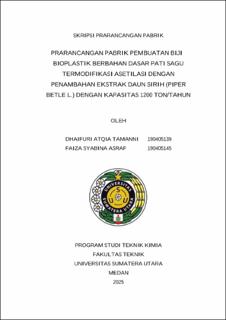| dc.description.abstract | The bioplastic pellet is produced using sago starch as the main raw material
because sago starch is easily degraded by nature due to its amylopectin content,
which exhibits polymeric properties suitable for plastic formation. The addition of
betel leaf extract serves as an antibacterial agent in the bioplastic to protect the
wrapped materials from microorganisms, aided by tannins that possess antibacterial
properties.
The preliminary design study focuses on a bioplastic pellet manufacturing
plant using acetylated modified sago starch with the addition of betel leaf extract
(Piper betle L.), with a production capacity of 1,200 tons per year, operating 330
days annually. The plant is planned to be located in the Belawan Industrial Area,
North Sumatra. The purpose of this preliminary design is to apply chemical
engineering principles, including mass balance, energy balance, equipment
specifications, chemical engineering operations, process design, utility systems,
and other relevant aspects of chemical engineering. The economic evaluation
results for the bioplastic pellet manufacturing plant using acetylated modified sago
starch with the addition of betel leaf extract are as follows:
Total capital investment : Rp 316.124.066.000,20
Production cost : Rp 114.280.480.039,11
Sales revenue : Rp 187.737.840.850,85
Net profit : Rp 45.664.920.301,25
Profit margin : 37,17%
Break even point : 44,27%
Return on investment : 14,45%
Pay out time : 7 Tahun
Return on network : 26,26%
Internal rate of return : 12,04%
Based on the economic analysis, it is concluded that the establishment of a
bioplastic pellet manufacturing plant using acetylated modified sago starch with the
addition of betel leaf extract is considered feasible. | en_US |


